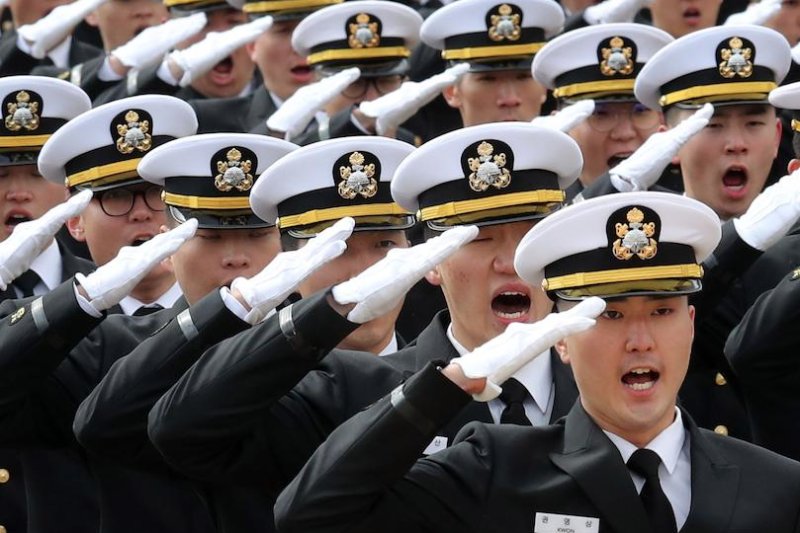
Openly gay soldiers and sailors have since seen active service in Iraq, but relatively few of the estimated 2, gay and lesbian sailors have felt sufficiently relaxed to come out since the ban was lifted. A spokesman for the navy accepted that pockets of prejudice remained and that there was "room for improvement" but said it was "committed to establishing a culture and climate where people can discuss their sexual orientation without risk of abuse or intimidation".
The partnership with Stonewall "will help the lesbians and gays within the Royal Navy be more comfortable and honest about their sexuality if they wish to", said the spokesman. It's an entirely private matter. There was once a "dark climate" in the navy, according to Lieutenant Commander Craig Jones, the most senior openly gay officer across all three armed forces. But he was now comfortable taking his partner to official functions and could laugh off jokes about being posted to Baghdad to "redecorate" the city.
He welcomed the link with Stonewall. If people are able to acknowledge my sexuality even through a little bit of well-intentioned banter, that's fine. It makes me feel they are comfortable with the fact that I am gay. It requires a certain robustness of character to be in the armed forces but that does not mean you should tolerate anything that is quite clearly inappropriate. In the last five years I've never had to reproach anybody. The navy's liaison with Stonewall was kept a closely guarded secret during more than 12 months of negotiations.
The group hopes the army and the RAF will follow the navy's incursion into once-forbidden territory. Ben Summerskill, chief executive of Stonewall, admitted he was surprised by how far the navy's attitude to homosexuality had shifted in recent years. He said he anticipated "upmarket saloon bar prejudice" against the partnership, but insisted the navy was not simply "ticking boxes".
They are not doing it to be touchy feely. In , blue discharges were discontinued and two new classifications were created: Under such a system, a serviceman or woman found to be gay but who had not committed any sexual acts while in service would tend to receive an undesirable discharge.
Those found guilty of engaging in sexual conduct were usually dishonorably discharged. Navy study known as the Crittenden Report dismissed the charge that homosexuals constitute a security risk, but advocated stringent anti-homosexual policies because "Homosexuality is wrong, it is evil, and it is to be branded as such.
From the s through the Vietnam War, some notable gay service members avoided discharges despite pre-screening efforts, and when personnel shortages occurred, homosexuals were allowed to serve. The gay and lesbian rights movement in the s and s raised the issue by publicizing several noteworthy dismissals of gay service members. Leonard Matlovich appeared on the cover of Time in Naval Academy. One report said that "having a same-gender or an opposite-gender orientation is unrelated to job performance in the same way as is being left- or right-handed.
Barbara Boxer introduced the Military Freedom Act, legislation to end the ban completely. Adams and Rep. Pat Schroeder D-Colorado re-introduced it the next year. During the U. Carl Mundy, Jr. AIDS and psychological well-being of others". Mundy called it "extremely insightful" and said it offered "a sound basis for discussion of the issue".
officer-in-navy gay dating
Navy petty officer Allen R. Schindler, Jr. The policy was introduced as a compromise measure in by President Bill Clinton who campaigned in on the promise to allow all citizens to serve in the military regardless of sexual orientation. Military Personnel Policy: Options and Assessment. It concluded that "circumstances could exist under which the ban on homosexuals could be lifted with little or no adverse consequences for recruitment and retention" if the policy were implemented with care, principally because many factors contribute to individual enlistment and re-enlistment decisions.
Herek , associate research psychologist at the University of California at Davis and an authority on public attitudes toward lesbians and gay men, testified before the House Armed Services Committee on behalf of several professional associations. He stated, "The research data show that there is nothing about lesbians and gay men that makes them inherently unfit for military service, and there is nothing about heterosexuals that makes them inherently unable to work and live with gay people in close quarters. In Congress, Democratic Senator Sam Nunn of Georgia led the contingent that favored maintaining the absolute ban on gays.
Reformers were led by Democratic Congressman Barney Frank of Massachusetts , who favored modification but ultimately voted for the defense authorization bill with the gay ban language , and Barry Goldwater , a former Republican Senator and a retired Major General, [34] who argued on behalf of allowing service by open gays and lesbians. In a June Washington Post opinion piece, Goldwater wrote: Congress rushed to enact the existing gay ban policy into federal law, outflanking Clinton's planned repeal effort.
Clinton called for legislation to overturn the ban, but encountered intense opposition from the Joint Chiefs of Staff , members of Congress, and portions of the public. DADT emerged as a compromise policy. The phrase was coined by Charles Moskos , a military sociologist. In accordance with the December 21, , Department of Defense Directive The "Don't Ask" provision mandated that military or appointed officials will not ask about or require members to reveal their sexual orientation.
The "Don't Tell" stated that a member may be discharged for claiming to be a homosexual or bisexual or making a statement indicating a tendency towards or intent to engage in homosexual activities. It ensured that the military would not allow harassment or violence against service members for any reason.
The Servicemembers Legal Defense Network was founded in to advocate an end to discrimination on the basis of sexual orientation in the U.
Date officer-in-navy man
Armed Forces. Forum for Academic and Institutional Rights, Inc. An association of law schools had argued that allowing military recruiting at their institutions compromised their ability to exercise their free speech rights in opposition to discrimination based on sexual orientation as represented by DADT. McVeigh won a preliminary injunction from a U. Navy for "homosexual conduct" after 17 years of service. His lawsuit did not challenge the DADT policy, but asked the court to hold the military accountable for adhering to the policy's particulars.
The case also attracted attention because a navy paralegal had misrepresented himself when querying AOL for information about McVeigh's account. Frank Rich linked the two issues: McVeigh reached a settlement with the Navy that paid his legal expenses and allowed him to retire with full benefits in July. The New York Times called Sporkin's ruling "a victory for gay rights, with implications for the millions of people who use computer on-line services". In July the Secretary of the Air Force ordered her honorable discharge. Dismissed by the district court, the case was heard on appeal, and the Ninth Circuit issued its ruling on May 21, Its decision in Witt v.
So any Gay Guys who have been in the Military or Navy post here?
Department of the Air Force reinstated Witt's substantive-due-process and procedural-due-process claims and affirmed the dismissal of her Equal Protection claim. Texas , determined that DADT had to be subjected to heightened scrutiny, meaning that there must be an "important" governmental interest at issue, that DADT must "significantly" further the governmental interest, and that there can be no less intrusive way for the government to advance that interest.
The Obama administration declined to appeal, allowing a May 3, , deadline to pass, leaving Witt as binding on the entire Ninth Circuit, and returning the case to the District Court. Leighton ruled that Witt's constitutional rights had been violated by her discharge and that she must be reinstated to the Air Force.
The government filed an appeal with the Ninth Circuit on November 23, but made no attempt to have the trial court's ruling stayed pending the outcome. She will retire with full benefits. The government argued that DADT was necessary to advance a legitimate governmental interest. According to plaintiffs, these statements alone satisfied their burden of proof on the due process claims. On September 9, , Judge Virginia A. Phillips ruled in Log Cabin Republicans v.
United States of America that the ban on service by openly gay service members was an unconstitutional violation of the First and Fifth Amendments. Supreme Court refused to overrule the stay. The constitutional issues regarding DADT are well-defined, and the District Court focused specifically on the relevant inquiry of whether the statute impermissibly infringed upon substantive due process rights with regard to a protected area of individual liberty. Engaging in a careful and detailed review of the facts presented to it at trial, the District Court properly concluded that the Government put forward no persuasive evidence to demonstrate that the statute is a valid exercise of congressional authority to legislate in the realm of protected liberty interests.
See Log Cabin, F. Hypothetical questions were neither presented nor answered in reaching this decision. On October 19, , military recruiters were told they could accept openly gay applicants. LCR opposed the request, noting that gay personnel were still subject to discharge.
Other Pennsylvania Cities:
On January 28, , the Court denied the Justice Department's request. On March 28, the LCR filed a brief asking that the court deny the administration's request. In , while waiting for certification, several service members were discharged under DADT at their own insistence, [68] until July 6 when a three-judge panel of the Ninth Circuit Court of Appeals re-instated Judge Phillips' injunction barring further enforcement of the U.
On July 15, the Ninth Circuit restored most of the DADT policy, [71] but continued to prohibit the government from discharging or investigating openly gay personnel.
Following the July murder of Army Pfc.
 Dating gay navy
Dating gay navy
 Dating gay navy
Dating gay navy
 Dating gay navy
Dating gay navy
 Dating gay navy
Dating gay navy
 Dating gay navy
Dating gay navy
Related dating gay navy
Copyright 2020 - All Right Reserved